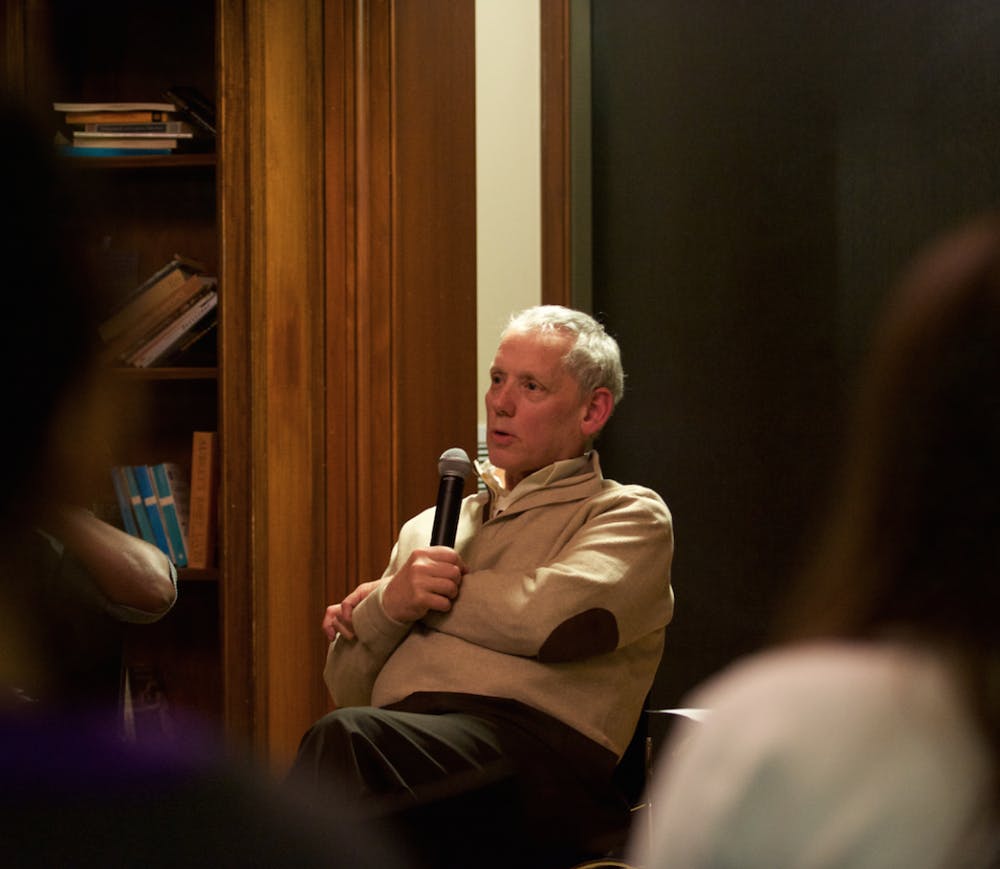While students learn countless lessons from their professors — often through hours absorbing lectures and taking notes of problem set solutions or discussion points — there are certain subjects that, over months and years of class, go unaddressed. Last Thursday’s installment of “It’s Not What You Think,” a new storytelling series started this January by President Patton, strived to change that.
Assistant Professor of Dance Christal Brown and Professor of Religion Larry Yarbrough gathered with a couple dozen students and faculty in the Abernethy Room in the Axinn Center to share their reflections on home and personal stories of hardship. The new “It’s Not What You Think” speaker series discussion is part of the College’s initiative to help build resilience and practice reflection on campus.
Moderated by Gaby Fuentes ’16, Thursday’s storytelling session focused on the shaping power of home. Both from the American South, Brown and Yarbrough discussed their feelings on growing up in their respective communities of Kinston, North Carolina, and Tuscaloosa, Alabama. Although the professors were raised in small, religious communities with similar levels of wealth, their experiences with racism growing up differed. Each speaker’s stories on the particular topic complemented the other’s in a way that made the audience wonder whether the pairing was chosen specifically because of this context.
“I thought it was really interesting that they picked Yarbrough, who grew up in the Deep South during the civil rights movement, and to contrast his experiences with Brown’s experiences,” said Richard Brach ’16.5. “It was interesting how they grew up in similar areas, but totally on the other side of the racial issue.”
Lucy Grinnan ’19.5 agreed. “It was interesting to hear their discussion of race coming from a white man and a black woman because they’re such different experiences,” she said. “I think it’s really valuable to hear people talk about their vastly different experiences with that much respect.”
Grinnan, whose family recently left her longtime home in Virginia, also added, “My views on home have just shifted and it’s something that I have really struggled with lately. It was valuable for me to hear someone struggling with the same kind of ideas about being a modern person in a place that is obsessed with the past.”
Brown and Yarbrough also shared the personal struggles they overcame and triumphs they reached in their academic and, eventually, professional endeavors.
Leila Faulstich-Hon ’19.5 left the hour feeling “... so joyful. I think part of that is just recognizing the plurality of narratives around us. It’s hard to step out of ourselves because you are your own world, but wwhen you just sit down to listen to someone — and listening is such a skill — it makes you so excited to learn more about the people around you.”
Erin Davis, an independent filmmaker in the town of Middlebury and a professor of the practice in the Film and Media Culture department, is developing a plan to turn the speaker series into an online podcast, available to students and faculty alike. Davis taught an interdisciplinary course in the fall titled Sounds of Childhood, which aimed to combine the academic study of childhood with the skills of sound production. Davis, the vocal host of the podcast, is currently producing and editing the audio content for the project.
“I’m creating a short series of pilot episodes that should be ready for launching next fall,” Davis said. “I expect it will be available online. It would be great for the college radio station. I’d love that.”
Whether heard online, over the radio or in the flesh, the stories of this series will aim to foster reflection in the community, and will remind listeners to consider each other’s personal experiences.
Brown reflected on the event’s significance.
“This is one of the rare occasions that students actually get to see their professors as people,” she said. “And I think that taking advantage of that should be a reciprocal process, because we often are in situations where one is in the position of giving knowledge and the other is in the position of taking knowledge. We need to make more opportunities to learn from one another.”
Professors Share Stories of Hardship and Home for ‘It's Not What You Think’ Series

Comments


